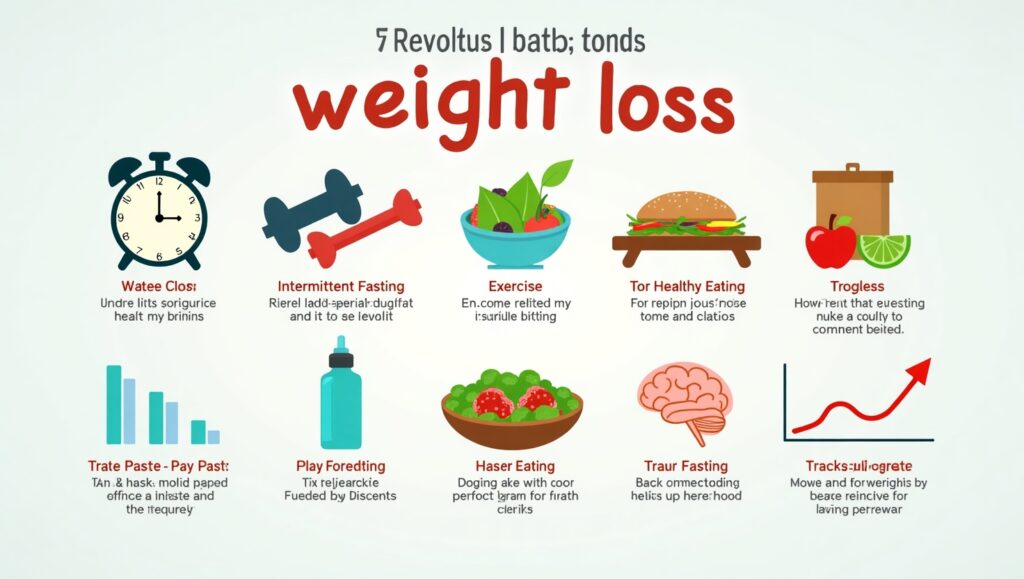Lose Weight Fast: 7 Science-Backed Strategies for Quick Results

Losing weight quickly and effectively is a common goal, but it’s essential to approach it with strategies backed by scientific evidence. This article will delve into seven proven methods that can help you achieve fast weight loss while maintaining your health. Whether you’re looking to shed a few pounds or embark on a significant transformation, these strategies can help you reach your goals efficiently.
1. Intermittent Fasting
Intermittent fasting (IF) has surged in popularity due to its effectiveness in promoting weight loss. This eating pattern involves alternating between periods of eating and fasting, which can help reduce calorie intake and boost fat burning.
How It Works:
- 16/8 Method: Fast for 16 hours and eat within an 8-hour window.
- 5:2 Diet: Eat normally for five days of the week and restrict calories to 500-600 on the other two days.
- Alternate-Day Fasting: Alternate between days of normal eating and days of fasting or very low calorie intake.
Scientific Basis:
Research indicates that intermittent fasting can increase metabolic rate and improve insulin sensitivity, leading to faster weight loss. During fasting periods, the body depletes glycogen stores and begins to burn fat for energy.
Tips for Success:
- Choose a method that fits your lifestyle.
- Stay hydrated during fasting periods.
- Focus on nutrient-dense foods during eating windows.
- Listen to your body and adjust as needed.
2. High-Intensity Interval Training (HIIT)
High-Intensity Interval Training (HIIT) is a time-efficient way to burn calories and lose weight fast. This form of exercise involves short bursts of intense activity followed by periods of rest.
How It Works:
HIIT workouts typically last between 10 and 30 minutes and involve exercises like sprinting, jumping jacks, and burpees. The high intensity increases your heart rate and boosts your metabolism, leading to increased calorie burn.
Scientific Basis:
Studies show that HIIT can be more effective for weight loss than traditional steady-state cardio. It increases human growth hormone (HGH) production, which helps burn fat and build muscle. Additionally, HIIT can improve insulin sensitivity and increase the afterburn effect.
Tips for Success:
- Start slowly and gradually increase intensity.
- Mix up your exercises to target different muscle groups.
- Allow adequate time for rest and recovery.
- Combine HIIT with strength training for best results.
3. Low-Carb, High-Protein Diet
A low-carb, high-protein diet is another effective strategy for fast weight loss. This approach reduces carbohydrate intake while increasing protein consumption, which can help control hunger and promote fat loss.
How It Works:
By reducing carbs, the body shifts from using glucose to burning fat for energy. High protein intake helps maintain muscle mass and supports satiety, making it easier to stick to a calorie deficit.
Scientific Basis:
Research shows that low-carb, high-protein diets can lead to significant weight loss by reducing appetite and increasing fat burning. These diets can also improve insulin sensitivity and reduce the risk of metabolic syndrome.
Tips for Success:
- Focus on whole, unprocessed foods like lean meats, fish, eggs, and vegetables.
- Limit carb intake to below 50-100 grams per day.
- Aim for at least 1 gram of protein per pound of body weight.
- Stay hydrated to manage hunger and support overall health.
4. Mindful Eating
Mindful eating involves paying close attention to your food and eating experience, which can help reduce overeating and promote healthier eating habits.
How It Works:
By slowing down and savoring your food, you become more aware of hunger and fullness cues. This practice can help you recognize when you’re full and avoid mindless snacking.
Scientific Basis:
Studies have shown that mindful eating can lead to weight loss by reducing emotional eating and improving portion control. It helps you develop a healthier relationship with food and improve overall eating habits.
Tips for Success:
- Eat slowly and chew your food thoroughly.
- Eliminate distractions like TV or electronic devices during meals.
- Pay attention to hunger and fullness cues.
- Keep a food journal to identify eating patterns and make healthier choices.

5. Adequate Sleep
Getting enough sleep is crucial for weight loss, as it affects hunger hormones, metabolism, and overall health.
How It Works:
Lack of sleep can increase hunger and cravings, making it harder to maintain a calorie deficit. Adequate sleep helps regulate hormones and supports overall health.
Scientific Basis:
Research shows that sleep deprivation can increase ghrelin (hunger hormone) and decrease leptin (satiety hormone). Adequate sleep can help regulate these hormones and support weight loss efforts.
Tips for Success:
- Establish a consistent sleep routine.
- Create a sleep-friendly environment (dark, quiet, cool).
- Limit screen time before bed to reduce blue light exposure.
- Practice relaxation techniques like meditation or deep breathing.
6. Hydration
Staying hydrated is essential for overall health and can significantly impact weight loss.
How It Works:
Drinking water can boost metabolism, reduce appetite, and increase calorie burning. Staying hydrated helps you differentiate between thirst and hunger, preventing unnecessary snacking.
Scientific Basis:
Studies show that drinking water can increase the number of calories burned at rest and help reduce calorie intake. Drinking water before meals can also lead to increased feelings of fullness.
Tips for Success:
- Aim for at least 8 cups of water per day.
- Monitor urine color to assess hydration levels.
- Eat water-rich foods like fruits and vegetables.
- Avoid sugary drinks to reduce calorie intake.
7. Stress Management
Chronic stress can lead to weight gain and hinder weight loss efforts. Managing stress effectively can support your weight loss journey and improve overall health.
How It Works:
Stress increases cortisol levels, which can promote fat storage, particularly around the abdomen. Managing stress can help regulate cortisol and support weight loss.
Scientific Basis:
Research indicates that high cortisol levels can increase appetite and fat storage. Effective stress management can help regulate cortisol and support weight loss efforts.
Tips for Success:
- Practice mindfulness techniques like meditation, yoga, or deep breathing.
- Stay active to reduce stress and improve mood.
- Connect with supportive friends and family.
- Seek professional help if stress becomes overwhelming.
Losing weight fast and achieving quick results is achievable with the right approach. By incorporating these seven science-backed strategies—intermittent fasting, HIIT, a low-carb, high-protein diet, mindful eating, adequate sleep, hydration, and stress management—you can create a comprehensive plan that supports rapid and sustainable weight loss. Remember, consistency and a commitment to your health are key to success. Start today, and take the first step towards a healthier, happier you.







